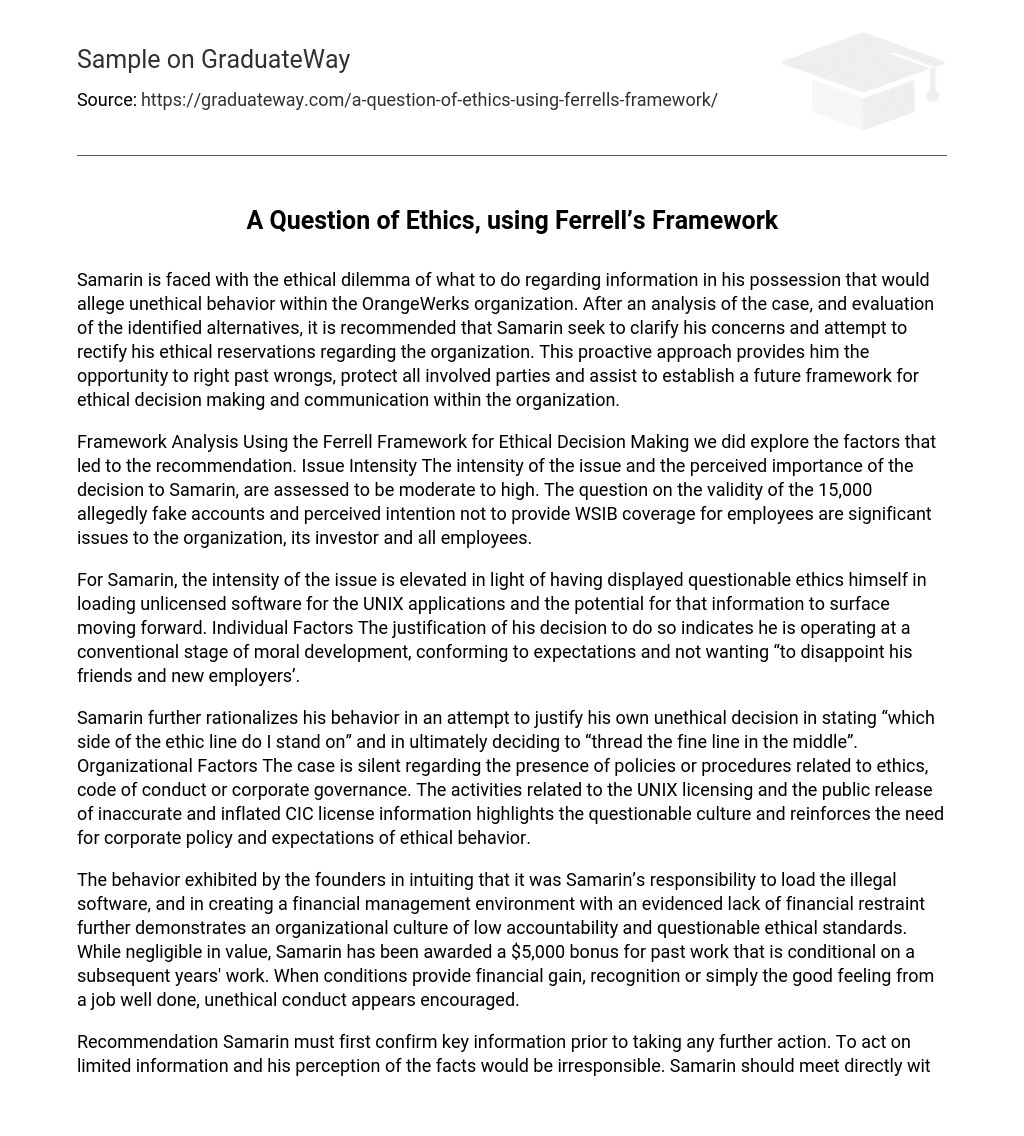Samarin is confronted with an ethical dilemma concerning the information he has that could reveal unethical actions within the OrangeWerks organization. After examining the case and considering different options, it is advised that Samarin address his concerns and try to address his ethical reservations about the organization. This proactive approach gives him a chance to correct previous misdeeds, safeguard all parties involved, and help establish a future system for making ethical decisions and communicating within the organization.
Using the Ferrell Framework for Ethical Decision Making, we conducted a framework analysis to investigate the factors that influenced the recommendation. We assessed the intensity of the issue and Samarin’s perception of the decision’s importance to be moderate to high. The organization, its investors, and all employees consider the question of the validity of the 15,000 allegedly fake accounts and the perceived intention not to provide WSIB coverage for employees to be significant issues.
For Samarin, the intensity of the issue increases because he has displayed questionable ethics himself by loading unlicensed software for the UNIX applications. This raises concerns about the potential for that information to surface in the future. In terms of individual factors, his decision to do so suggests that he is operating at a conventional stage of moral development. He is conforming to expectations and does not want to disappoint his friends and new employers.
Samarin justifies his unethical decision by contemplating “which side of the ethic line do I stand on” and ultimately choosing to “thread the fine line in the middle”. The case does not mention any policies or procedures related to ethics, code of conduct, or corporate governance. The questionable culture surrounding the UNIX licensing activities and the release of inaccurate and inflated CIC license information emphasizes the necessity for corporate policies and ethical behavior expectations.
The founders’ behavior, including their belief that it was Samarin’s duty to load illegal software and their creation of a financial management environment lacking fiscal discipline, highlights a company culture with little accountability and questionable ethics. Despite having minimal worth, Samarin has been given a $5,000 bonus for previous work, which is dependent on their performance in the following year. This demonstrates how unethical actions seem to be incentivized when they offer financial benefits, recognition, or a sense of accomplishment.
Samarin must confirm important information before proceeding. It would be irresponsible to act based on limited information and personal perception. He should directly meet with the founders to clarify three matters: 1) was payment made for UNIX licensing, 2) what is the purpose and significance of the 15,000 “fake” accounts, and 3) does the organization indeed have WSIB coverage. Their responses will guide his next steps.
If the founders state that there is no need to acquire licenses for the UNIX software, that the extra 15,000 licenses are part of the business marketing strategy to obtain more funding, and that there will be no financial consequences resulting from this action, as well as assuring Samarin that the WSIB was an oversight and will be fixed, he is faced with only two alternatives. He can either maintain his trust in the company and its founders, and collaborate towards improving the culture by developing, implementing, and communicating corporate policies.
Alternatively, he can choose to leave the company with the assurance, as opposed to a suspicion, that the company’s founders will continue to engage in unethical behavior. If the organization is clearly beyond influence, Samarin should exit while maintaining his integrity and reputation. If Samarin decides to resign based on the outcomes of his conversation with the founders or the failure to adhere to developed policies, he should discuss his findings and clarify his resignation to the angel investor. Samarin has an oral obligation to the person(s) who have a financial stake in, but no primary control over, the organization. Regardless of whether he remains with or departs from the organization, Samarin should endeavor to rectify his previous wrongdoing by procuring the appropriate licenses for the UNIX software if he has the ability and authority to do so. As an alternative, Samarin can choose to do nothing. By doing so, he disregards the distinction between right and wrong, abdicates his responsibility as an employee, leader, and stakeholder, and jeopardizes the organization, his colleagues, and the investments made by the investors.
The case analysis does not support this alternative. Samarin can choose to stay with the organization and attempt to lead a change initiative aimed at improving the ethical climate. If Samarin believes that the founders will still behave unethically, he should use his position to establish an ethical committee or help create a company code of conduct. Our team does not support this alternative because it is a passive approach that does not aim to rectify previous misconduct.
Furthermore, without the backing of top management, any endeavors to enhance the ethical climate within the organization will be unsuccessful. In conclusion, Samarin is now equipped with an analysis and a framework to guide his decision-making. He intends to question the founders about their previous actions, how they plan to address and rectify those transgressions, and based on their responses, he will formulate a predetermined course of action and be ready to implement his final decision in order to resolve the matter.





